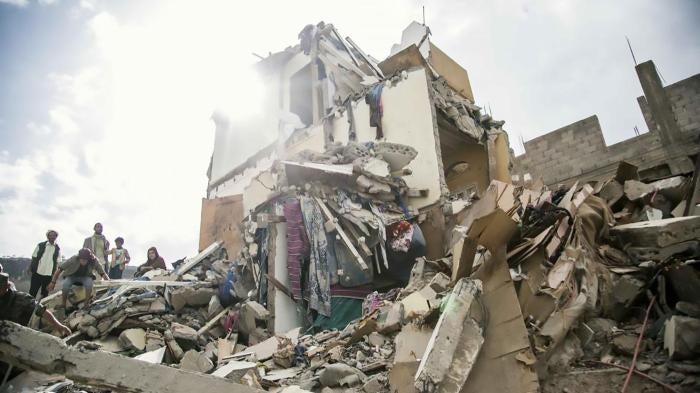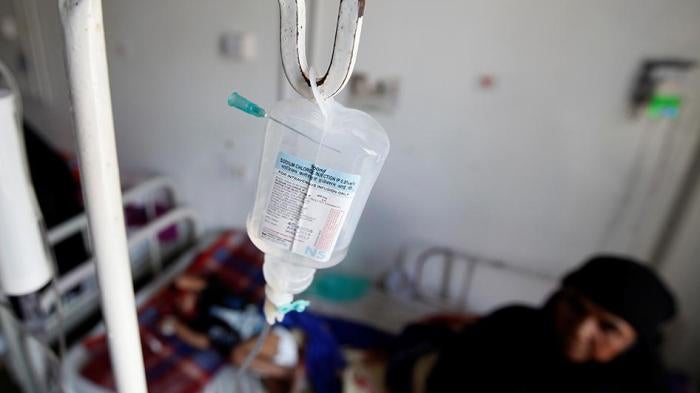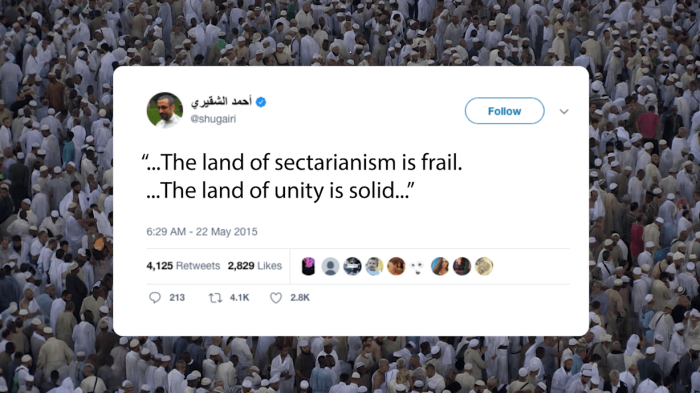On June 21, King Salman removed Mohammed bin Nayef as interior minister and crown prince, and appointed his son, Mohammed bin Salman, as the new crown prince. Mohammed bin Salman also serves as Minister of Defense. The succession move followed the removal of the country’s notorious prosecution service from the Interior Ministry and its transformation into an agency reporting directly to the royal court. In addition, in July King Salman removed the domestic intelligence agency and counterterrorism powers from the Interior Ministry and merged them into the newly-created Presidency of State Security, which reports directly to the royal court. In September, the King decreed that women will be allowed to drive from June 2018, ending a long-standing ban.
Through 2017, the Saudi-led coalition continued a military campaign against the Houthi rebel group and their former allies, forces loyal to now-deceased former president Ali Abdullah Saleh in Yemen, that included scores of unlawful airstrikes that killed and wounded thousands of civilians. On June 5, Saudi Arabia, Bahrain, and the UAE cut off diplomatic relations with Qatar and ordered the expulsion of Qatari citizens and the return of their citizens from Qatar.
Saudi authorities continued their arbitrary arrests, trials, and convictions of peaceful dissidents. Dozens of human rights defenders and activists continued to serve long prison sentences for criticizing authorities or advocating political and rights reforms. Authorities continued to discriminate against women and religious minorities.
Yemen Airstrikes and Blockade
As the leader of the nine-nation coalition that began military operations against Houthi-Saleh forces in Yemen on March 26, 2015, Saudi Arabia has committed numerous violations of international humanitarian law. As of November, at least 5,295 civilians had been killed and 8,873 wounded, according to the UN human rights office, although the actual civilian casualty count is likely much higher. In 2017, the Office of the High Commissioner for Human Rights (OHCHR) reported that airstrikes remained the single largest cause of civilian casualties.
Since March 2015, Human Rights Watch has documented 87 apparently unlawful attacks by the coalition, some of which may amount to war crimes, killing nearly 1,000 civilians and hitting homes, markets, hospitals, schools, and mosques. The coalition carried out six apparently unlawful airstrikes in Yemen between June and September 2017, that killed 33 children among 55 civilian deaths. Human Rights Watch also documented how the Saudi-led coalition repeatedly attacked civilian factories, warehouses, and other protected sites in violation of the laws of war.
Human Rights Watch documented at least 18 coalition attacks using cluster munitions, which killed or wounded dozens of civilians. Saudi Arabia is not a party to the Convention on Cluster Munitions, which bans the weapon. In December 2016, the coalition announced it would stop using a British-made cluster munition, but in 2017 Human Rights watch documented the coalition’s use of Brazilian-made cluster munitions.
The conflict exacerbated an existing humanitarian crisis. By 2017, an estimated 17 million Yemenis were unable to meet their food needs, according to the United Nations. The conflict also precipitated an unprecedented cholera outbreak, which by September had killed 2,000 people and was suspected to have infected up to 700,000. The war has largely destroyed Yemen’s heath system.
By December, the Saudi-led coalition had announced findings of preliminary investigations into some 40 widely publicized coalition airstrikes causing civilian casualties. The coalition-appointed panel of investigators found that in almost every case the coalition was pursuing a legitimate military target and recommended compensation for victims in only a few attacks. Human Rights Watch is unaware of any steps to pay compensation to victims of these attacks or prosecute individuals who committed war crimes.
In September, the UN Human Rights Council established an international, independent body to carry out comprehensive investigations into abuses in Yemen.
Freedoms of Expression, Association, and Belief
Beginning on September 10, Saudi authorities carried out a wave of arrests of clerics and others in what appeared to be a coordinated crackdown on dissent.
Saudi Arabia continued to repress pro-reform activists and peaceful dissidents. In early 2017, authorities arrested human rights activists Essam Koshak, Issa al-Nukheifi, Ali Shaban, and Ahmed al-Musheikhis. Authorities eventually referred Koshak and al-Nukheifi for trial in the country’s notorious Specialized Criminal Court, the country’s counterterrorism tribunal, on charges solely related to their human rights work. Saudi Arabia continues to use 2014 counterterrorism regulations to suppress political expression and dissent.
Over a dozen prominent activists convicted on charges arising from their peaceful activities were serving long prison sentences. Prominent activist Waleed Abu al-Khair continued to serve a 15-year sentence imposed by Saudi Arabia’s Specialized Criminal Court that convicted him in 2014 on charges stemming solely from his peaceful criticism in media interviews and on social media of human rights abuses. Prominent blogger Raif Badawi served the fourth year of his 10-year sentence, but authorities did not flog him in 2016 and 2017, as they previously did in January 2015.
On January 18, Saudi Arabia’s Specialized Criminal Court sentenced Nadhir al-Majid to seven years in prison and a seven-year ban on travel abroad. The conviction was based on his participation in protests in Saudi Arabia’s Eastern Province in 2011 against discrimination against the country’s minority Shia community, communication with international media and human rights organizations, and articles calling for an end to discrimination against the Shia.
By 2017 Saudi Arabia had jailed nearly all the founders of the banned Saudi Civil and Political Rights Association (ACPRA). In August, an appeals court upheld an eight-year sentence against ACPRA activist Abd al-Aziz al-Shubaily based solely on his peaceful pro-reform advocacy.
Saudi Arabia does not tolerate public worship by adherents of religions other than Islam and systematically discriminates against Muslim religious minorities, notably Twelver Shia and Ismailis, including in public education, the justice system, religious freedom, and employment. Government-affiliated religious authorities continued to disparage Shia and Sufi interpretations, versions, and understandings of Islam in public statements and documents.
Saudi Arabia has no written laws concerning sexual orientation or gender identity, but judges use principles of uncodified Islamic law to sanction people suspected of committing sexual relations outside marriage, including adultery, extramarital and homosexual sex. If individuals are engaging in such relationships online, judges and prosecutors utilize vague provisions of the country’s anti-cybercrime law that criminalize online activity impinging on “public order, religious values, public morals, and privacy.”
In February 2017, Saudi police arrested 35 Pakistani citizens, some of whom were transgender women. One of them died in detention. Her family said her body bore signs of torture, while the Saudi authorities said she had died of a heart attack.
Criminal Justice
Saudi Arabia applies Sharia (Islamic law) as its national law. There is no formal penal code, but the government has passed some laws and regulations that subject certain broadly-defined offenses to criminal penalties. In the absence of a written penal code or narrowly-worded regulations, however, judges and prosecutors can convict people on a wide range of offenses under broad, catch-all charges such as “breaking allegiance with the ruler” or “trying to distort the reputation of the kingdom.”
Detainees, including children, commonly face systematic violations of due process and fair trial rights, including arbitrary arrest. Authorities do not always inform suspects of the crime with which they are charged, or allow them access to supporting evidence, sometimes even after trial sessions have begun. Authorities generally do not allow lawyers to assist suspects during interrogation and sometimes impede them from examining witnesses and presenting evidence at trial.
Judges routinely sentence defendants to floggings of hundreds of lashes. Children can be tried for capital crimes and sentenced as adults if there are physical signs of puberty.
During 2017, authorities continued to detain arrested suspects for months, even years, without judicial review or prosecution. In mid-September, Saudi authorities arrested dozens of people, including prominent clerics and intellectuals, in what appeared to be a coordinated crackdown on dissent. On November 4, Saudi authorities initiated a mass arrest of princes, current and former government officials, and prominent businessmen over corruption allegations, some of whom are reportedly held in a five-star hotel in Riyadh.
As of November, Ali al-Nimr, Dawoud al-Marhoun, Abdullah al-Zaher and Abdulkareem al-Hawaj remained on death row for allegedly committing protest-related crimes while they were children in 2011 and 2012. Saudi judges based the capital convictions primarily on confessions that the defendants retracted in court and said had been coerced, and the courts did not investigate the allegations that the confessions were obtained by torture.
In mid-July, Saudi Arabia’s Supreme Court upheld death sentences against fourteen members of the Saudi Shia community following an unfair trial for protest-related crimes. Courts convicted the 14 based on confessions they had repudiated in court, saying that they were coerced. In July, an appeals court upheld death sentences against another 15 men accused of spying for Iran. The verdict now requires approval by the Supreme Court and the king’s signature.
In late July, Saudi security forces surrounded and sealed off the predominantly Shia town of Awamiya as they confronted an armed group hiding in a historic neighborhood slated for demolition. The violence in Awamiya, which began in May, resulted in deaths and injuries among the residents and caused significant damage to the town. Residents and activists said that security forces had fired at civilians in areas far from the clashes, and residents that remained in Awamiya lacked essential services such as medical care. A majority of residents fled the clashes.
According to Interior Ministry statements, Saudi Arabia executed 138 persons between January and early December, mostly for murder and drug crimes. Fifty-seven of those executed were convicted for non-violent drug crimes. Most executions are carried out by beheading, sometimes in public.
Women’s and Girls’ Rights
Women in Saudi Arabia face formal and informal barriers when attempting to make decisions or take action without the presence or consent of a male relative.
In April, King Salman issued an order stipulating that government agencies cannot deny women access to government services simply because they do not have a male guardian’s consent unless existing regulations require it. If adequately enforced, the order could end arbitrary guardian consent requirements that government bureaucracies impose on women. Under the order, all government agencies were required to provide a list by mid-July of procedures that require male guardian approval, suggesting that authorities might review these rules and regulations and even eliminate some.
Nevertheless, Saudi Arabia’s discriminatory male guardianship system remains intact despite government pledges to abolish it. Under this system, adult women must obtain permission from a male guardian—usually a husband, father, brother, or son—to travel abroad, obtain a passport, marry, or be discharged from prison. They may be required to provide guardian consent to work or access healthcare. Women regularly face difficulty conducting a range of transactions without a male relative, from renting an apartment to filing legal claims.
In July, authorities briefly detained a woman named “Khulood” after a Snapchat video appeared showing her wearing a short skirt and top, which revealed her partial midriff as she walked through the Heritage Village of Ushayqir, 100 miles north of Riyadh. Saudi Arabia maintains a strict public dress code – women must wear a loose black garment called an abaya and headscarf.
In September, the King decreed that women will be allowed to drive from June 2018. However, a ministerial committee is to make “the necessary arrangements to implement it” in 30 days. Reuters reported that the Saudi ambassador to the United States, Prince Khalid bin Salman, stated that women would not require their guardian’s permission to obtain a license and would be permitted to drive without their guardian present. However, it is unclear if other restrictive rules will apply. Previous proposals to end the driving ban have included restrictions such as limiting driving licenses to women age 30 and over or allowing driving only during daylight hours.
Saudi Arabia continues to discriminate against women and girls by denying them the same opportunities to exercise and play sports as men and boys. In a positive step forward, however, Saudi Arabia’s Education Ministry announced in July that Saudi girls’ schools will offer a physical education program beginning in the fall 2017 school term “in accordance with Islamic law standards” and would scale up “according to the possibilities available in each school,” including sports halls and competent women instructors. No public girls’ schools currently have sports facilities, and the statement did not say whether physical education will be mandatory for girls, or if schools will require girls to get parental permission to enroll in physical education classes. In October, authorities announced that they would permit women to attend public sporting events for the first time.
Migrant Workers
Over 9 million migrant workers fill manual, clerical, and service jobs, constituting more than half the workforce. Some suffer abuses and exploitation, sometimes amounting to conditions of forced labor.
The kafala (visa sponsorship) system ties migrant workers’ residency permits to “sponsoring” employers, whose written consent is required for workers to change employers or leave the country under normal circumstances. Some employers confiscate passports, withhold wages, and force migrants to work against their will. Saudi Arabia also imposes an exit visa requirement, forcing migrant workers to obtain permission from their employer to leave the country. Workers who leave their employer without their consent can be charged with “absconding” and face imprisonment and deportation. Such a system traps many workers in abusive conditions and punishes victims who flee abuse.
In March, Saudi Arabia announced plans to deport foreign workers found in violation of existing labor laws, including those without valid residency or work permits, or those found working for an employer other than their legal sponsor. Authorities ordered that undocumented migrants must register their intention to leave with the Saudi authorities by August 24 or face detention, fines, and eventual deportation. Of the estimated 10 million migrant workers in Saudi Arabia, up to 500,000 are Ethiopian, a significant number of whom arrived after fleeing serious Ethiopian government abuses.
Saudi Arabia is not a party to the 1951 Refugee Convention and has not established an asylum system whereby people who fear being returned to places where their lives or freedom would be threatened may apply for asylum or to prevent their forced return.
Domestic workers, predominantly women, faced a range of abuses including overwork, forced confinement, non-payment of wages, food deprivation, and psychological, physical, and sexual abuse without the authorities holding their employers to account. Workers who attempted to report employer abuses sometimes faced prosecution based on counterclaims of theft, “black magic,” or “sorcery.”
Key International Actors
The United States offered only muted criticism of Saudi human rights violations. Meanwhile, as a party to the armed conflict in Yemen, the US provided logistical and intelligence support to Saudi-led coalition forces, including refueling coalition planes on missions in Yemen. During a visit to Riyadh in May, President Trump announced US$110 billion worth of arms deals to Saudi Arabia, despite significant opposition from members of Congress concerned about Saudi conduct in Yemen. In June, a US Senate vote over the sale of about $500 million in precision-guided munitions to Saudi Arabia passed by a narrow margin, 53-47.
In April, United Nations member states elected Saudi Arabia to serve on the UN Commission on the Status of Women, a body “dedicated to the promotion of gender equality and the empowerment of women,” despite its record of longterm, systematic discrimination against women. In May, UNESCO, the UN’s educational, scientific, and cultural agency, held its 7th International Forum of NGOs in Riyadh, even though Saudi Arabia does not allow independent nongovernmental organizations (NGOs) or activists to function and puts advocates of human rights in jail. In June, Saudi Arabia was elected as a deputy member of the governing body of the International Labour Organization (ILO), even though unions are not permitted in Saudi Arabia and abuses against migrant workers remain widespread. Despite its bad human rights record at home and abroad, Saudi Arabia is currently serving its second term as a member of the UN Human Rights Council.
In September, the UN Human Rights Council set up by consensus a Group of Eminent Experts to conduct international investigations into violations and abuses in Yemen. In October, the UN Secretary General placed the Saudi-led coalition on his “list of shame” for violations against children in Yemen.







